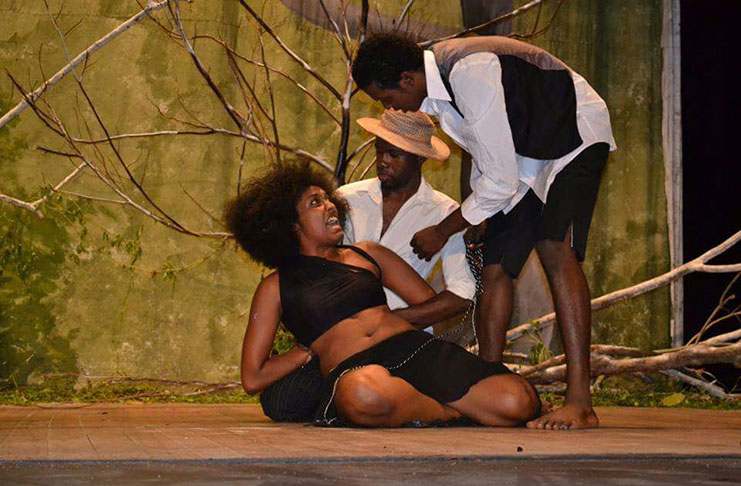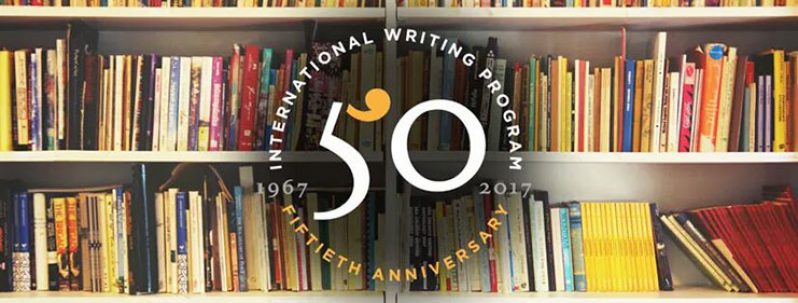Guyanese writer Subraj Singh bound for International Writing Programme
By Gibron Rahim
WRITING is an incredible force for change. It is not an exaggeration that it can change the world. A new generation of writers has emerged in our country to carry on the torch of

those who came before them. Among them is Subraj Singh. His works reflect the Guyanese experience and have been featured and awarded locally. Most recently, he has been selected for a three-month residency at the University of Iowa’s International Writing Program (IWP).
Founded in 1967, the IWP has hosted over 1,400 writers from over 140 countries since its inception. Over a 12-week period every Fall, the writers in the programme are allowed the opportunity to work on their own projects, as well as to give readings and lectures, collaborate with other artists and travel and interact with American audiences and literary communities. The University of Iowa itself is located in Iowa City, which has been designated a UNESCO City of Literature.
In an interview with the Pepperpot Magazine, Subraj revealed that he initially had doubts about being admitted to the programme . He first heard about it from Ruel Johnson who participated in the programme last year. He said that, after conducting research and realising how competitive and prestigious the IWP was, he did not believe he would gain admission. However, he was nominated by the United States Embassy.
“There are nominations that take place all across the world,” Subraj noted. He explained that once these nominations are sent in, applications and samples are screened and then decisions are made. After this process, 30-35 writers are selected for the programme. And Subraj counted himself thankful to be among those selected this year.

The sharing of their literary works is a key part of the IWP. Numbering among Subraj’s pieces that he will be sharing is ‘Rebelle and Other Stories’. The collection of short stories won the 2014 Guyana Prize for Literature in the Best First Book of Fiction category. The scripts of the first two parts of his ‘Rebellion Trilogy’ of plays – ‘Laugh of The Marble Queen’ and ‘Masque’ – are also making the trip. ‘Laugh of the Marble Queen’, a one-act play, won Best Junior Play at the 2015 National Drama Festival as well as seven of the 15 awards it was nominated for, including Best New Guyanese Play.
It also won first prize in the Drama category of the Jubilee Creative Writing Competition. Subraj also credits it with helping to establish him as ‘a playwright of some worth.” ‘Masque’, a postcolonial, post-modern play like ‘Laugh of The Marble Queen’, also made an impact at last year’s National Drama Festival with wins in the categories of Best Production and Best New Guyanese Play, among others, and is currently representing Guyana at CARIFESTA XIII.

New material
These more established works will be joined by new material Subraj has been working on. Referring to the new pieces he said, “A lot of them came out of the Creative Writing programme I was a part of at the National School of Theatre Arts and Drama (NSTAD) this year.” The pieces were written as part of his academic work in the course. He considers them a kind of return to fiction for him since he had written all the stories for the ‘Rebelle and Other Stories’ collection and then moved on to mostly playwriting.
The stories he said were his attempt at returning to fiction and reminding himself that he can still excel at writing it. He also wanted to remind himself that fiction writing was just as important to him as playwriting. “And it can serve the same purposes as playwriting,” he was sure to add.
The pieces he has chosen represent Subraj as a writer and as a Guyanese. He referred to prominent figures in Guyanese literature such as Wilson Harris, Edgar Mittelholzer, Mark McWatt, Mahadai Das and Martin Carter. He expressed that the works of these writers need to be appreciated. At the same time, he spoke of there being a new breed of writers that are up and coming and doing great work. A lot of these writers are young people. In terms of his own writing, “I think my writing represents the concerns of a millennial, West Indian man.”
The themes he deals with are current and are important to young people such as sexuality, colonisation and racism. All of these themes are ones that he feels contemporary Guyanese are still trying to grapple with. Culture also plays an important part in his work and he includes a lot of elements of Guyanese folklore and history. This is crucial as he said, “If I’m going to write about the ‘now’ then I also have to write about the ‘then,’ because they are linked and one influences the other.”
What he expects from IWP
Subraj expressed excitement at the prospect of meeting the other 34 writers from all across the world and regards it as an extraordinary opportunity. The writers in this year’s IWP come from places as varied as Iraq, Australia, Egypt, Argentina and Zimbabwe. “I think each of these writers is going to bring something unique,” he said.
It is an opportunity for him to learn from their individual techniques and experiences. The prospect of sharing Guyanese literature with people from all over the world is also a thrilling one. Guyana is not well-known in terms of identity and ideals and Subraj declared literature as a way of introducing people to Guyana.
The IWP aims to create an environment conducive to writing and Subraj intends to make use of the time to work on new projects. He told the Pepperpot Magazine that he has two projects he intends to work on while in Iowa. One of them is a collection of Guyanese plays that are based on local folklore and the other is a young adult novel.
The young adult novel is something new for him. He has a really good idea for the novel he said and will use the 12 weeks of the residency to mold and hopefully develop that idea into a manuscript. He was also happy to reveal that he and the Ministry of Education are working on getting ‘Rebelle and Other Stories’ published. If all goes according to plan, the book will be out by the end of the year.
The local writing industry
Subraj also took the time to share his views on issues affecting Guyana’s literary arts industry. On whether there are gatekeepers to the industry, he said, “If you’re an artist and you have to rely on other people to make your art happen, then you’re sort of failing as an artist.” Being creative, innovative, making one’s own way, making one’s views and ideologies known through one’s art are all part of being an artist.
He said if an artist is passionate enough, they will find a way to make their art happen, even if gatekeepers exist. He added, though, that there are valid complaints that warrant calling out the people responsible. He expressed though that these legitimate complaints should not stop artists from getting their art out there.
In terms of his hopes for Guyana’s literary arts industry, Subraj spoke of the hope of having a publishing house and copyright legislation in the future. “The rights and the works of artists need to be protected,” he said. He also wishes for more innovative measures to be implemented to stimulate interest in creative writing in Guyana. These would include workshops and writing courses at the University of Guyana.
Most important though is the cultivation of an environment where artists, including writers, are “respected and valued as much as doctors and lawyers and every other clichéd occupation Guyanese parents try to force onto their children.”
Subraj’s words of advice to aspiring writers are that they need to be open to criticism. He has met writers who are offended when their works are criticised. Honest criticism, he believes, is a very important part of the writing process. His own inspiration to become a writer came from his love of reading.
Someone cannot be a good writer without being a good reader he explained, adding that it involves loving books, movies, songs and plays and all the forms in which narrative comes. He feels that from a very young age he understood how all these forms can help people because they helped him.
“I think writing is a form of helping others. Writing can change lives. It can change whole nations. Poems can be a catalyst for a revolution. Plays can bring people together. Short stories can tear people apart. Writing has power. I think I recognised the power of telling stories through writing and I think that’s what drew me to it.”




.png)









